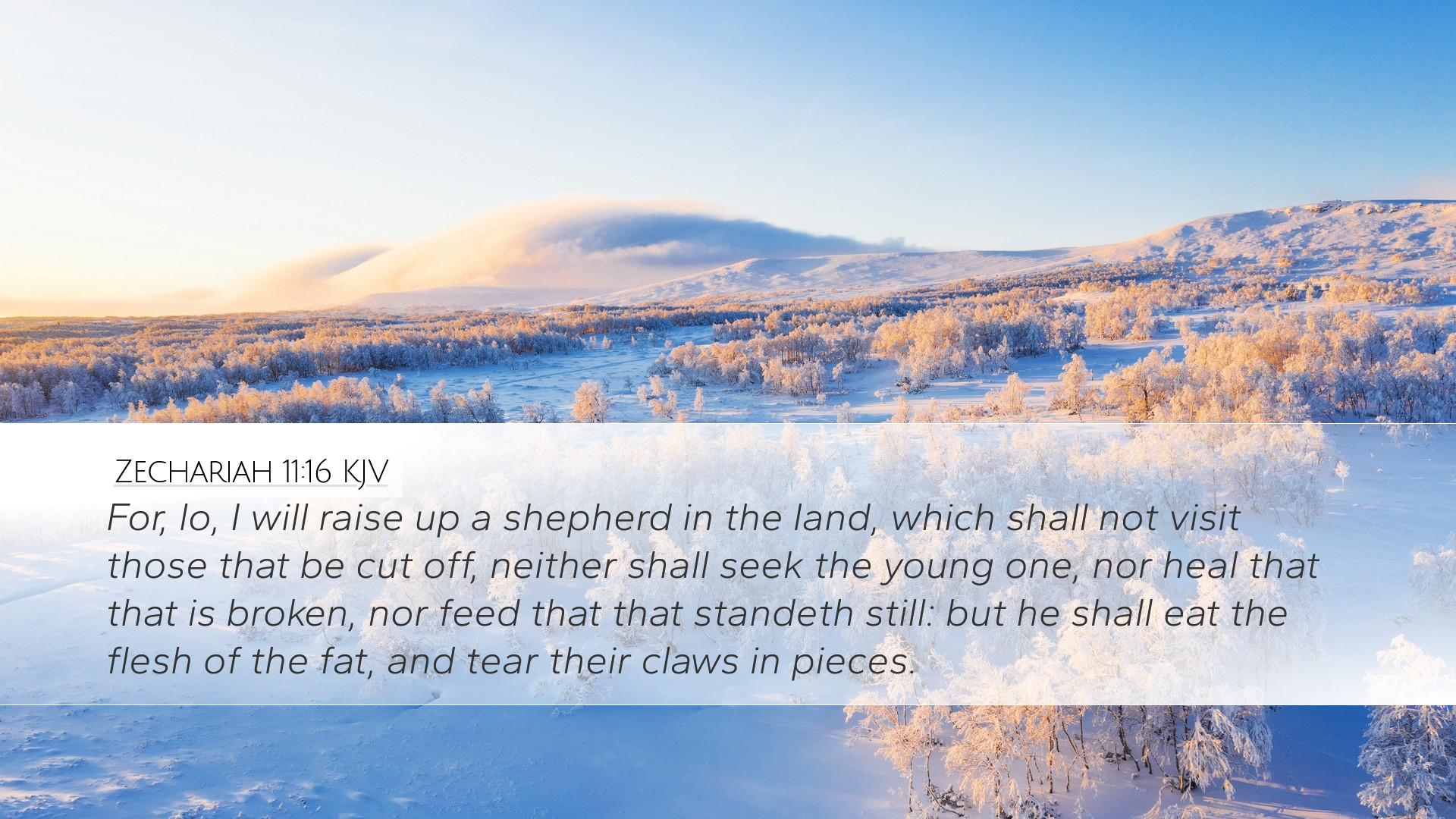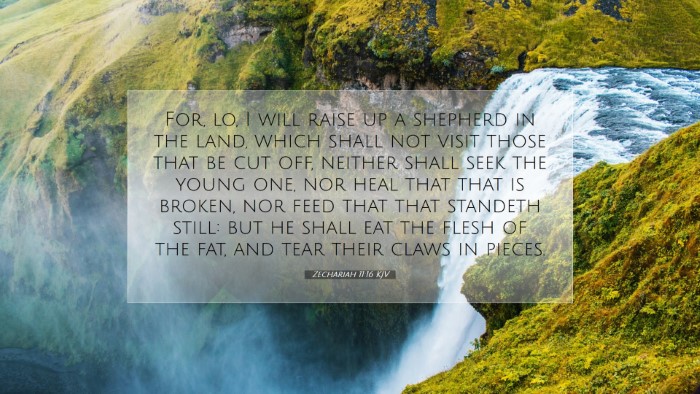Old Testament
Genesis Exodus Leviticus Numbers Deuteronomy Joshua Judges Ruth 1 Samuel 2 Samuel 1 Kings 2 Kings 1 Chronicles 2 Chronicles Ezra Nehemiah Esther Job Psalms Proverbs Ecclesiastes Song of Solomon Isaiah Jeremiah Lamentations Ezekiel Daniel Hosea Joel Amos Obadiah Jonah Micah Nahum Habakkuk Zephaniah Haggai Zechariah MalachiZechariah 11:16
Zechariah 11:16 KJV
For, lo, I will raise up a shepherd in the land, which shall not visit those that be cut off, neither shall seek the young one, nor heal that that is broken, nor feed that that standeth still: but he shall eat the flesh of the fat, and tear their claws in pieces.
Zechariah 11:16 Bible Commentary
Commentary on Zechariah 11:16
Zechariah 11:16 states:
"For, lo, I will raise up a shepherd in the land, which shall not visit those that be cut off, neither shall seek the young one, nor heal that that is broken, but he shall eat the flesh of the fat, and tear their claws in pieces."
Introduction
This verse presents a stark and sobering picture of the kind of shepherd that God will raise up for His people. The imagery of shepherding is crucial in biblical theology, encapsulating notions of guidance, protection, and care. However, in this context, it is contrasted with the ideal shepherd—highlighting the neglect and brutality of leadership that the people will experience.
Exegesis and Meaning
Understanding Zechariah 11:16 necessitates a broader view of Zechariah's prophetic ministry, especially focusing on the prevalent themes of judgment and restoration in the post-exilic community. The shepherd metaphor is particularly significant as it traditionally represents divine guidance and governance.
Analysis of Key Phrases
- “I will raise up a shepherd”: This declaration signifies God's sovereign action in times of crisis. The word "raise up" implies that God will allow the rise of leadership but not of the kind that aligns with His intentions.
- “which shall not visit those that be cut off”: The neglect referenced here indicates a leader who fails to care for those who are marginalized, including the wounded and spiritually broken. This is a direct critique of leaders who abandon their responsibilities.
- “neither shall seek the young one”: The young ones represent the vulnerable in society—those who need nurture and protection. The absence of seeking highlights a leadership that is indifferent to the needs of the helpless.
- “nor heal that that is broken”: This phrase speaks volumes about the pastoral role of mending the brokenhearted, a role that is utterly denied by the shepherd in this verse.
- “but he shall eat the flesh of the fat”: There is a grotesque irony in this imagery, where the shepherd, instead of feeding the flock, consumes the very essence of those he is intended to protect. This symbolizes exploitation and selfishness.
- “tear their claws in pieces”: Such violent imagery suggests a predatory relationship rather than one of care. These actions reveal a betrayal by a leader who is supposed to guide.
Theological Implications
Zechariah 11:16 serves as a poignant reminder of the responsibilities of those in leadership positions within the church and society at large. It emphasizes the need for moral integrity, compassion, and genuine care for the people. The contrast between the ideal and the real shepherd urges leaders to reflect on their practices.
Matthew Henry's Insights
Matthew Henry highlights the consequences of poor leadership and God's sovereignty in raising leaders. He reflects on how God’s raising of a shepherd who neglects the flock demonstrates His judgment upon those who fail in their divine responsibilities. Henry states that this shepherd represents a false or corrupt leader, leading to potential annihilation of divine virtues within the community.
Albert Barnes' Commentary
Albert Barnes expands on the notion of unworthy leadership by emphasizing the traits of those in shepherd roles that neglect their duties. He outlines this verse as both a warning and a prophecy, asserting that such shepherds existed in Zechariah's time and would continue to rise. Barnes articulates the hope that comes from recognizing such failures and the eventual restoration that God will accomplish through true shepherds in the future.
Adam Clarke's Perspectives
Adam Clarke discusses the implications of this verse concerning the leaders of Israel, portraying them as predatory and self-serving. He relates the shepherd's actions to the leaders of both past and modern contexts, warning against the implications of negligence in spiritual leadership. Clarke also suggests that this verse serves as prophetic foreshadowing of Christ, the ultimate Shepherd who would fulfill the role that earthly leaders failed to execute.
Practical Applications
There are several practical applications that can be derived from Zechariah 11:16 for contemporary ministry:
- Accountability in Leadership: Leaders must hold themselves accountable to God and to their congregations. They should prioritize the care of their flock over personal gain.
- Compassion and Care: Like the true Shepherd, leaders are called to care for the brokenhearted and the needy, reflecting God's heart for His people.
- Awareness of Spiritual Blindness: Leaders must remain vigilant against becoming indifferent or blind to the needs of their communities, ensuring they actively engage with the needs of those they serve.
- Restoration seeks action: Just as God promises restoration, leaders should be in the constant act of seeking to mend and heal those within their care.
Conclusion
The message of Zechariah 11:16 is a clarion call for vigilance against the dangers of neglectful leadership. It reminds pastors, students, theologians, and scholars alike about the immense weight of responsibility borne by those in leadership. The verse serves both as an admonition and as an assurance of God’s promise that true shepherds will eventually be established, pointing believers towards the ultimate fulfillment found in Christ.


